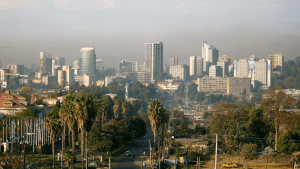Ethiopian Prime Minister Abiy Ahmed is a possible contender for the 2019 Nobel Peace Prize for the reconciliation he forged in 2018 with Eritrea. He’s currently the bookmakers’ favourite to win after climate change activist Greta Thunberg. The winner is due to be announced on Friday.
The neighbours and Horn of Africa countries fought a war that killed more than 70,000 people from 1998 to 2000 and failed to implement a 2000 peace deal. But on July 8, 2018, Eritrea’s President Isaias Afwerki warmly welcomed Ahmed to the Eritrean capital Asmara.
The meeting was the first of its kind in the 20-year military stand-off between the leaders of the two neighbours.
“The situation between the two countries ran into deadlock, so it needed that courage somehow to change the situation and that’s really what happened, and credit goes to the Prime Minister for doing that, but on the other hand I would rather say it was pushed too fast and after a year we haven’t seen a full scale institutionalization of that peace process,” said Dereje Feyissa, a professor at Addis Ababa University.
Abiy took office in April 2018 and is pushing Ethiopia towards new democratic freedoms, and trying to open the country up to the outside world after decades of security-obsessed isolation.
Abiy has ended a state of emergency, freed political prisoners, got parliament to lift a “terrorist” ban on opposition groups, and pledged to facilitate foreign investment in key sectors of the economy.
As a result of these sweeping changes Abiy is hugely popular with young people.
Abiy has also won additional praise for using his diplomatic skills to ease the political crisis that followed the overthrow of Sudan former president, Omar al-Bashir in April 2019.
But some are uneasy about Abiy’s leadership style, which both fans and critics say often relies on personal initiative and charisma instead of government institutions
It’s unclear how much of the fractious ruling coalition backs his initiatives or how durable they are without his leadership. He’s already survived one assassination attempt — a grenade thrown at a rally last year.
Ethiopia has been among Africa’s fastest growing economies for more than a decade. But the uncertainty over Abiy’s ability to carry out all his reforms worries both citizens and the foreign investors Abiy is courting to develop the antiquated telecoms and banking sectors.
“A year ago, there was nothing but this kind of relying on this charismatic political resources, because there was ideological crisis and the ruling party was deeply divided so he could not really rely on the party structure so in that sense charismatic persona had its own pacifying role, but I think we have reached a level where this is no longer fit for the purpose, there must be some kind of concrete policies and deal with structural problems and challenges,” Feyissa added.
Some say Abiy’s often unpredictable, personal style is because his reforms must keep breakneck momentum or risk becoming mired in sclerotic bureaucracy.
“Some of the cabinet and MPs are the same old faces. They haven’t changed. So they may not go the way he wants them to go. Therefore some of the decisions that he makes bypassing them could be for the sake of the people. That is why most of the decisions he makes appear to be individualistic,” said Tibebu Girma, who lives in Addis.
Abiy, 43, is a former military officer specialising in cyber intelligence and science and technology minister. He’s from the Oromo group, the nation’s largest, which spearheaded the protests that forced his predecessor to resign.
Ethiopia has a population of more than 100 million people. It is Africa’s second most populous nation after Nigeria – with more than 40% of the population under the age of 15.






